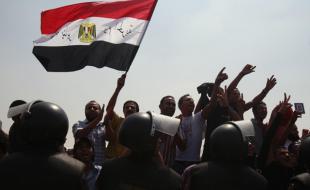UPDATES
Egypt – Opponents of Islamism Uniting?
August 17, 2011 | Tzvi Fleischer

In Egypt, it is being reported that 14 political groups opposed to the Muslim Brotherhood and other Islamist parties there have united to form a new bloc – called the “The Egyptian Bloc” – to compete in the upcoming parliamentary elections. Some details about the groups involved and their deal to compete and campaign together are here and here.
This seems to be good news – a sign that the liberal forces which sparked the Egyptian revolution, and have not only looked unprepared for the elections, but been largely driven from the streets in recent weeks, are perhaps starting to get their act together.
However, academic Barry Rubin warns that there are reasons not to get too excited about this news, including:
- Fourteen parties sounds an impressive grouping but most of them are not very important and have little or no base of support. I estimate that the committed parties collectively can claim about 25 percent support, mostly for the Free Egyptians party (al-Masriyin al-Ahrar).
- Some of the parties are left-wing and anti-democratic parties. One of them is the Communist Party, which gives you a sense of how “moderate” and “liberal” are being defined.
- The most important of all centrist parties, the Wafd, which has about 20 percent support, seems undecided as to whether to join this bloc or remain in an alliance with the Muslim Brotherhood. That last point also tells you something about the nature of contemporary Egyptian politics.
Further, as Rubin noted in an earlier comment, Egypt’s ruling military junta has placed Asmaa Mahfouz, one of the key leaders of the February Revolution, on trial before a military tribunal for an intemperate Facebook comment. The charges of “inciting violence against the military and insulting the armed forces” against Mahfouz appear to be a sign of how determined the military is to crack down on liberal opposition groups and how much of an uphill struggle these groups will continue to face.
Finally, Michael Totten, a roving Middle East reporter who is always worth reading, has done a series of interviews with Egyptian political activists who used to be members of the Muslim Brotherhood, but no longer are. One thing that comes across in the interviews is that the view expressed by many in the West that the Muslim Brotherhood has moderated and contains a diversity of opinion is one not shared by these knowledgeable insiders. Perhaps most striking was this exchange between Totten and Mohammad Adel, who used to work on the Muslim Brotherhood’s website.
“Is there a model of governance that exists somewhere in the world that the Muslim Brotherhood wants to emulate here?” I [Totten] said.
“Some of them went to Turkey to learn from that model,” he [Adel] said. “But the Egyptian youth who would otherwise be similar to the youth in Turkey’s Islamist party have been expelled from the Brotherhood here. They were seen as being too non-religious.”
“Turkey’s AKP isn’t religious enough for the Brotherhood?” I said.
“The Brothers think of the AKP as liberal and they don’t want that here,” he said. “They’ve expelled the liberal Islamists from the group.”
I could only assume then that Gaza is what Egypt’s Brotherhood has in mind, or maybe a Sunni Arab version of what Persian Shia Islamists have built in Iran.
“I would like for the Muslim Brotherhood to be more like Hamas,” Adel said.
That stopped me cold. “You want the Brotherhood to be like Hamas?” I said.
“Yes,” he said. “Because Hamas is more liberal. The Brotherhood here no longer has any liberal members. Hamas is more willing to cooperate with other movements than the Muslim Brotherhood is.”
“I want to make sure I understand what you’re saying,” I said. “Your view is that Hamas represent liberal Islamism.”
“Not that they’re liberal,” he said, “but they have members who are. They have a liberal Islamist element. The Egyptian Muslim Brotherhood has chosen to expel its liberal Islamists. The Brotherhood thinks dealing with anyone who is a former member, someone who was expelled or who resigned, or someone from other movements and parties, is like dealing with an infidel.”
Read more about Totten’s encounters with Adel as well as other ex-Brotherhood members here.
Tags: Egypt





